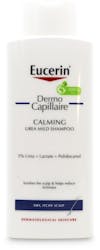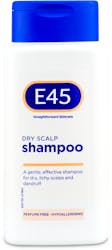Dandruff Treatment
Many of us have experienced dandruff at some point in our lives. In fact, it can affect almost half of all adults. It’s a common skin condition that isn’t contagious, but it can be embarrassing. Luckily, there are a number of dandruff treatments that can help to manage the condition. Read more to find out all about dandruff symptoms, causes and treatments.
More about dandruff
What is dandruff?
Dandruff, also called seborrheic dermatitis, is a common condition that causes the skin on your scalp to start flaking. It’s also known as seborrheic eczema or seborrheic psoriasis. Even though this can be an embarrassing condition, especially when it becomes noticeable, the good news is that it’s not contagious, it’s not caused by poor hygiene and it can be treated relatively easily with the right dandruff treatments. At home treatments will usually be enough to improve your dandruff but, if it lasts for longer than a month, even with treatment, you should see your GP.
What are dandruff symptoms?
Even though dandruff is mostly noticeable on your scalp, it can also affect other places on your body, like your beard, eyebrows, shoulders or other areas. Dandruff symptoms include:
- Flaking skin on your scalp, face, chest and other areas on your body
- Red patches that cause an itchy scalp
- Yellowish, crusty and greasy patches on your baby’s scalp and nappy area – this is also known as cradle cap
What causes dandruff?
Dandruff and an itchy scalp can be caused by a few different things. Here’s a rundown of a few of them:
- Oily skin that becomes irritated
- Not washing your hair with shampoo enough
- A fungus, called Malassezia, that feeds on the oils on your scalp
- Dry skin
- A sensitivity to hair care products – also known as contact dermatitis
- Other skin conditions, like psoriasis and eczema
Besides these causes, there are certain people who may be more likely to get dandruff. These include:
- People can get dandruff after going through puberty and right through to middle age. Some people may also experience dandruff as they get older and others may even have it for life.
- Men are more likely to get dandruff. Even though it’s still not known for certain, some researchers think this may be because of male hormones.
- People who have illnesses like Parkinson’s disease, HIV or other diseases that affect the nervous system. Also, dandruff has been linked to other conditions that cause a weakened immune system.
How to treat dandruff
Thankfully, it’s relatively easy to treat dandruff at home. These are a few dandruff treatments that you could try.
Dandruff shampoo
Shampoos are probably the most well-known ways to treat dandruff. If you have a very mild case, you might want to choose a daily shampoo like Head & Shoulders Classic Clean Anti-Dandruff Shampoo. If you have a more serious case of dandruff you could try a medicated shampoo like Selsun Dandruff Shampoo. It reduces greasiness on your scalp and slows down the process of new and developing skin cells. Initially, you’ll only use this dandruff shampoo twice a week for two weeks, then once a week for two weeks.
Hair treatments for dandruff
Besides flaking, dandruff can give you a dry, itchy scalp that can also be red, rough, scaly and sensitive. If this happens, you could try using a hair treatment like Eucerin Dermo Capillaire Calming Urea Scalp Treatment. With a natural ingredient, it provides an intensive moisturising and calming effect for a dry, itchy scalp.
Scalp exfoliation
Your body will naturally replace dead skin cells with new ones, but sometimes it can do with a bit of exfoliating help – especially on your scalp if you have dandruff. You can make your own scalp exfoliator with products you’ll already have at home, or you could choose one like L’Oréal Elvive Phytoclear Anti-Dandruff Exfoliating Scrub. It’s enriched with pure essential oils that get rid of impurities and can be used before you shampoo your hair.
Hair washing
Washing your hair more often will remove dandruff scales as quickly as they start forming on your scalp. Also, certain ingredients in shampoos may help to make flakes smaller and less visible. If a regular shampoo doesn’t help you may want to rather choose a daily anti-dandruff shampoo like Palmolive Naturals Anti-Dandruff Shampoo.
Home remedies for dandruff
If you’re looking for more natural dandruff treatments, you’re in luck. There are a few products you might have at home that could help. Tea tree oil has proven anti-microbial and anti-inflammatory properties and may even help with dandruff. You need to be careful when using it, as it could cause irritation if you have sensitive skin. Before using it, you should add just a few drops to a carrier like KIKI Health Organic Coconut Oil before using it directly on your skin. Some other natural remedies include:
- Apple cider vinegar: some people think that this can stimulate the shedding of dead skin cells on your scalp, although this has not been studied, so there is no conclusive evidence.
- Omega-3s: an omega-3 fatty acid deficiency may cause dry hair, dry skin and even dandruff, so you may want to consider taking a supplement if you’re not getting enough in your diet.
- Probiotics: it may sound a bit strange because probiotics are usually associated with your gut, but they may also help your immune system which could help your body fight fungal infections that cause dandruff.
Can dandruff cause hair loss?
Dandruff itself doesn’t directly lead to hair loss, but scratching your scalp can harm hair follicles, which could lead to some temporary hair loss. It’s not likely to cause complete baldness, though. People who have male or female pattern baldness may experience more hair loss if they have dandruff, which is why it’s important to use dandruff treatments.
How do I get rid of dandruff?
Getting rid of dandruff is a usually a long-term process and, sometimes, may even last a lifetime. Even so, by using the dandruff treatments we listed above, it’s quite easy to get the condition under control. To effectively get rid of dandruff, it’s important that you follow the directions on the treatment products you use. If your dandruff doesn’t get better after a month of using a home treatment, you should contact your GP or chat to a pharmacist.















































